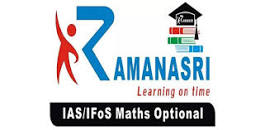
How to Prepare Maths Optional for UPSC, IAS, IFoS(IFS), CSE-Civil Services Mains Examinations?
UPSC Maths Optional Syllabus is a not broad subject as you people are thinking. We have to follow specific rules to make it the very smallest optional syllabus in the UPSC/IAS/CSE-Civil Service Mains Examination. So it is essential to understand the core concepts to get the highest score to create history in the UPSC Maths Optional subject like previous toppers what they have done already. There are three branches of mathematics: business mathematics or CSAT maths/quant, pure mathematics, and applied mathematics. Business math involves the active use of govt business principles to run the national business successfully for the betterment of India. It is helpful to clear CSAT Paper 2 prelims.
In contrast, pure math is more theoretical. It involves modern algebra, linear algebra without matrices, and Real analysis concepts. And finally major part of mathematics comes under applied mathematics, which is of most and foremost interest to below-average students. If you think mathematics is too your interesting subject after 10 the class, you can choose this maths optional. You can always opt to keep it as an optional subject for the UPSC examination.
The syllabus for UPSC mathematics optional includes topics like Analytical Geometry, Linear Algebra with matrices, Calculus, Ordinary and Partial Differential Equations, Vector Analysis, Complex Analysis, Numerical Analysis, Computer Programming, Linear Programming, Applied & Mathematical Physics topics like Dynamics, Statics, Fluid Dynamics and Mechanics. Generalized coordinates, D'Alembert's principle, Hamilton equations, and Lagrange's equations come under the Mechanics portion. These topics are repeating across the previous year's question papers from 1992 to 2022. Studying Ramanasri Maths Optional Coaching requires a deep understanding of the Ramanasri UPSC Maths study materials. While preparing for UPSC mathematics optional, reading past questions and practicing solving sums is essential. You should practice similar problems from our study materials for the physics section like Fluid Dynamics, Mechanics, Statics, and Dynamics.
There are no shortcuts to success in the UPSC mathematics optional exam. The key is to keep revising and maintain your self-made short notes. Make sure to allocate dedicated time for revision for the last 1 month. Study previous years' full-length papers and mock tests and learn to write answers systematically. There is no need to look at the answer scripts of toppers, and you have to give your answers reviewed by a mentor. Do not cram the maths sections; instead, focus on the essential things and most current trends.
The UPSC maths optional syllabus contains some of the essential topics for the exam. A good idea for preparing for it is to read previous years' question papers and review the topics that have been covered. You can also take the help of past year's exam papers and mock tests. For answer-writing, practice solving examples from the previous year's paper and practice through mock tests. Avoid the temptation to memorize mathematics and focus on building a logical flow in the questions.
There are many advantages to choosing mathematics as an optional subject for UPSC. This syllabus includes linear algebra, analytics geometry, ordinary differential equation, algebra, real analysis, and statistics. The syllabus includes two separate papers, each containing 250 marks. This means it is a tough test, but it is not impossible. There are some factors that you should consider to prepare for UPSC mathematics. The first factor is that it is a static subject. So there is no need to panic and be boring. Ramanasri Sir will cover every module and topic in your mains maths optional paper exam.
The first step for preparing for UPSC mathematics optional is to study previous years' exam question papers from 2009 to 2022. This way, you'll know what topics are repeated and which are important. Sometimes they were asked the same questions again and again. You need to go through the question papers from previous years to know which topics are the most difficult to answer. You should also take notes on the concepts and solve as many questions as possible. If you can't remember a concept, you should read the relevant parts in our study material and practice it to find the correct answer and solution.
We (Ramanasri UPSC Maths Optional Coaching) are providing Only Online Maths Optional Coaching Classes & Pen Drive Maths Optional Coaching Classes & Self-Study Mathematics Program, Maths Optional Mains Test Series in All over India. We are closed Regular Maths Optional Coaching Classes & Weekend Maths Optional Coaching Classes due to safety of our Aspirants. so you can spend you quality time in preparation without wasting valuable time to become IAS/UPSC, IFS/IFoS Maths Optional Toppers in your First Attempt. Your safety is our main concern & we will keep you posted about further updates.
Register Now
What are you waiting for ?

-Civil-Services-Guidance-Mentor-Teacher.jpg)